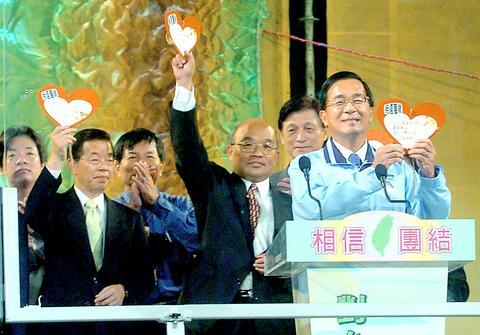In a surprise development, President Chen Shui-bian (陳水扁) yesterday announced at a rally in Tainan his intention to push through a new round of referendums at the end of the year.
After expressing gratitude to Tainan residents for their support in the presidential election, Chen proposed that a referendum be held on two topics -- whether or not to halve the number of seats in the Legislative Yuan and whether to establish a committee to review Chinese Nationalist Party (KMT) party assets.
Proposed laws on both issues are currently stalled in bill form in the Legislative Yuan due to disagreement among legislators.

PHOTO:CHU PEI-YA, TAIPEI TIMES
The proposed law to reduce the size of the legislature envisions cutting the number of seats in the legislature from 225 to 113 and would go into effect in 2007, but the bill failed to pass in the run-up to the presidential election last month.
The bill to review the legality of KMT party assets has met with resistance from legislators who belong to the KMT and the People First Party (PFP).
Chen did not offer additional specifics about the newly proposed referendum topics.
Saying that if the pan-blue camp wanted a referendum, he would give them one, Chen drew attention to what he characterized as discrepancies in the pan-blue camp's reasoning.
"The pro-blue camp originally accused us of ulterior motives when we proposed holding a referendum along with the presidential election," Chen said.
"However, they now obviously think that it's fair to hold a referendum during an election, since they want to tie the year-end legislative elections to a referendum on the establishment of a `truth committee' and a committee to review the national security defense mechanism," he said, referring to the pan-blue camp's proposal to hold a referendum on whether to establish a committee that would investigate the assassination attempt on Chen and whether to review documents related to the implementation of the national security mechanism.
The pan-blue camp has called both the assassination attempt and the triggering of the national security mechanism into question, accusing Chen of ploys to reduce the number of votes cast for the KMT-PFP alliance in the presidential election.
Chen lambasted the pan-blue camp's demands.
"What is the truth? The truth is that they are being sore losers. The truth is that they are being irresponsible by not stepping down after their loss. They are making society pay for their irrationality," Chen said.
Chen characterized the pan-blue politicians as looking down on the Taiwanese people.
"How can they say that pan-green supporters are low class? Is it shameful to be `barefooted?' How does wearing leather shoes make someone `better?'" Chen said, referring to PFP Legislator Liu Wen-shiung's (劉文雄) comparison of "leather-shoed" Taipei City Mayor Ma Ying-Jeou (馬英九) to "barefooted," newly sworn-in Minister of the Interior Su Jia-chyuan (蘇嘉全).
The rally was held to thank the Democratic Progressive Party's Tainan supporters for their help and enthusiasm during the presidential election last month.
Much attention was given to the president's security at the rally, with increased police personnel on alert.
The president wore a bulletproof vest and spoke at a podium that was protected by bullet-proof glass.

A Ministry of Foreign Affairs official yesterday said that a delegation that visited China for an APEC meeting did not receive any kind of treatment that downgraded Taiwan’s sovereignty. Department of International Organizations Director-General Jonathan Sun (孫儉元) said that he and a group of ministry officials visited Shenzhen, China, to attend the APEC Informal Senior Officials’ Meeting last month. The trip went “smoothly and safely” for all Taiwanese delegates, as the Chinese side arranged the trip in accordance with long-standing practices, Sun said at the ministry’s weekly briefing. The Taiwanese group did not encounter any political suppression, he said. Sun made the remarks when

The Taiwanese passport ranked 33rd in a global listing of passports by convenience this month, rising three places from last month’s ranking, but matching its position in January last year. The Henley Passport Index, an international ranking of passports by the number of designations its holder can travel to without a visa, showed that the Taiwan passport enables holders to travel to 139 countries and territories without a visa. Singapore’s passport was ranked the most powerful with visa-free access to 192 destinations out of 227, according to the index published on Tuesday by UK-based migration investment consultancy firm Henley and Partners. Japan’s and

BROAD AGREEMENT: The two are nearing a trade deal to reduce Taiwan’s tariff to 15% and a commitment for TSMC to build five more fabs, a ‘New York Times’ report said Taiwan and the US have reached a broad consensus on a trade deal, the Executive Yuan’s Office of Trade Negotiations said yesterday, after a report said that Washington is set to reduce Taiwan’s tariff rate to 15 percent. The New York Times on Monday reported that the two nations are nearing a trade deal to reduce Taiwan’s tariff rate to 15 percent and commit Taiwan Semiconductor Manufacturing Co (TSMC, 台積電) to building at least five more facilities in the US. “The agreement, which has been under negotiation for months, is being legally scrubbed and could be announced this month,” the paper said,

Japan and the Philippines yesterday signed a defense pact that would allow the tax-free provision of ammunition, fuel, food and other necessities when their forces stage joint training to boost deterrence against China’s growing aggression in the region and to bolster their preparation for natural disasters. Japan has faced increasing political, trade and security tensions with China, which was angered by Japanese Prime Minister Sanae Takaichi’s remark that a Chinese attack on Taiwan would be a survival-threatening situation for Japan, triggering a military response. Japan and the Philippines have also had separate territorial conflicts with Beijing in the East and South China